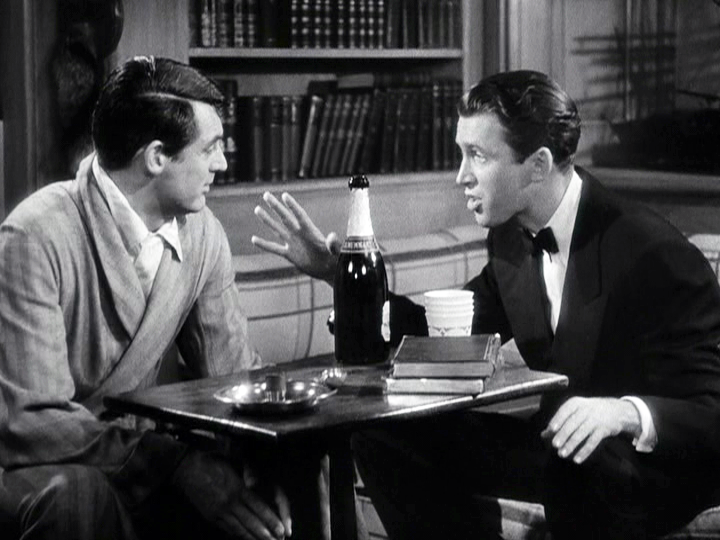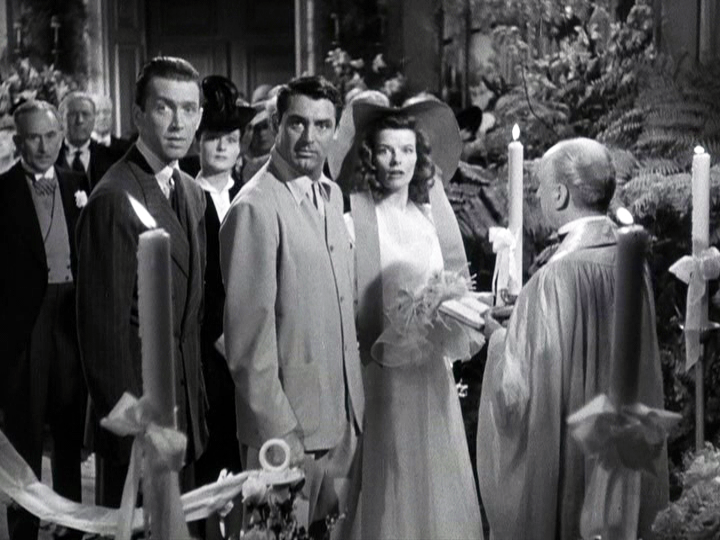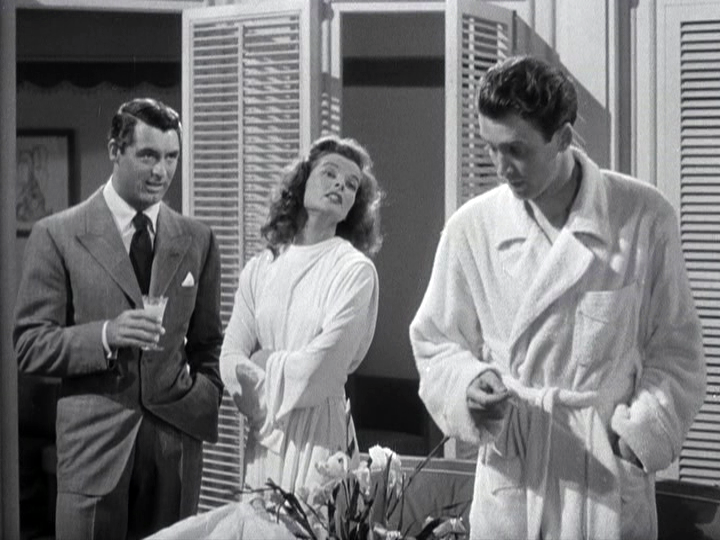The Philadelphia Story, 1940, Metro-Goldwyn-Mayer. Starring Cary Grant, Katharine Hepburn, James Stewart. Directed by George Cukor. B&W, 112 minutes.
Fiery, feisty Philadelphia socialite Tracy Lord (Katharine Hepburn) is ready to marry again, two years after her divorce from C.K. Dexter Haven (Cary Grant). Much to her chagrin, Dexter, a former newspaperman, shows up the day before the wedding with two tabloid reporters he tries passing off as friends of Tracy’s brother: writer Macauley (Mike) Connor (James Stewart) and photographer Elizabeth Imbrey (Ruth Hussey). Tracy isn’t fooled, but agrees to let them stay when Dexter tells her by covering the wedding he’s keeping the paper from a tell-all story about her father and his indiscretions.
Tracy quickly is becoming intrigued by Mike, and the two find themselves together perhaps a bit more often than a proper engaged woman should allow. That doesn’t stop Dexter from keeping a close watch for opportune moments to step in and take back Tracy’s heart.
The story line has taken a turn in that the rivalry is primarily between Dexter and Mike, with the fiancé virtually becoming a non-entity. Yet despite the battle for Tracy’s affection, the two remain gentlemanly toward each other. They are perhaps a little less kind to George, the fiancé, however.

Cary Grant. James Stewart
Katharine Hepburn first starred on Broadway in the stage version of The Philadelphia Story, and, as a gift from Howard Hughes, owned the film rights. She sold those rights to MGM for the paltry sum of $250,000 in exchange for decision-making power in the selection of producer, director, co-stars and screenwriter.
Her first choices for the male stars were Clark Gable as C.K. Dexter Haven and Spencer Tracy as Mike Connor, but neither were available. Hepburn had not met either man at that point. A few short years later she and Tracy would meet on the set of Woman of the Year and begin a life-long affair.
Reviews of the film were overwhelmingly positive. “Terribly funny, terribly upper class,” was how the Time magazine movie critic described it. The New York Times critic wrote: “this (film)… has just about everything that a blue-chip comedy should have—a witty, romantic script; ….the flavor of high-society elegance, in which the patrons invariably luxuriate, and a splendid cast of performers.” Audiences loved it as well, and flocked to see it, breaking a box-office record at Radio City Music Hall.
When asked about the film’s great appeal, Grant told a reporter, “When I go to the movies I want to forget the dirty dishes in my sink, and what’s on my mind. I want to forget my troubles, get out of myself. I want to laugh a little.”
The Philadelphia Story was nominated for six Academy Awards and won two: Best Actor for James Stewart and Best Adapted Screenplay (based on the 1939 play of same name). Stewart was not expecting to win, admitting in his acceptance speech he’d voted for Henry Fonda. Many believed the award was given to him as compensation for not receiving it a year earlier for Mr. Smith Goes to Washington.

James Stewart, Cary Grant, Katharine Hepburn
Ruth Hussey gives a compelling performance as the patient, level-headed photographer in love with Mike Connor, despite his apparent oblivion to her affection. Both female characters in this film are strong and independent, qualities not undermined by their love for their men.
Two years after being declared “box office poison” by the Independent Theater Owners of America, Katharine Hepburn proved she was as powerful a leading lady as ever in her role in The Philadelphia Story. Never one to doubt her own worth, she set out to make a movie that proved her star power, and she succeeded.

[…] via The Philadelphia Story — Classic for a Reason […]
LikeLiked by 1 person
Thanks for the re-blog!
LikeLike
Great blog! Thanks for such good stuff…keep ’em coming.
LikeLike
Kate, Cary and Jimmy–Hollywood’s finest!
LikeLiked by 1 person
It doesn’t get any better!
LikeLiked by 1 person
Hooray for those who don’t listen to what others criticize, as in “box office poison” for what would we have gained without tenacity and perseverance? Wonderful work again Belinda!xo
LikeLiked by 1 person
Thank you! And I agree…nothing was going to keep her down.
LikeLike
Instead of remakes I’d love for Hollywood to put some money towards proper restorations and a limited re-release of films like The Philadelphia Story in theaters. Seeing Katharine, Cary Grant, James Stewart and Ruth Hussey on the big screen would be a dream come true.
Of course I know some people are lucky enough to get screenings of classic films like this in their city. Sadly I’m not lucky enough to live in one of those cities.
LikeLiked by 1 person
I’m not either, and I agree with you about restorations. I know many films have undergone this process, but not nearly enough. Thank you for visiting my site!
LikeLike
[…] That never stopped this phenomenal actress, who two years later turned her luck around with The Philadelphia Story. Playing a ditzy heiress was not her best role; she did well in later roles playing privileged […]
LikeLike
[…] Philip Barry, author of the play, came to Hepburn with his latest work. That piece turned out to be The Philadelphia Story, one of Hepburn’s most iconic roles. The chemistry between Hepburn and Grant was also […]
LikeLike